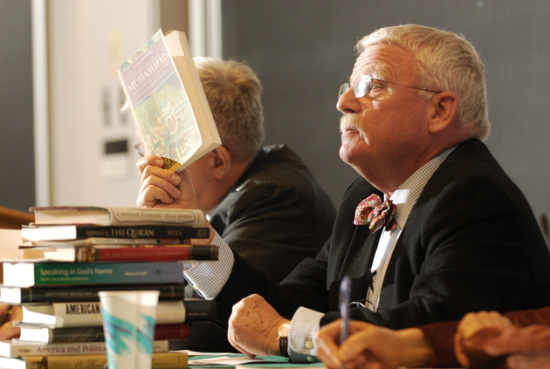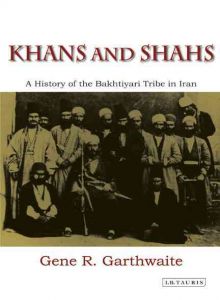 Gene Garthwaite, a scholar of the Middle East and pioneer in the field of Iranian Studies, retires this June after a 43-year teaching career at Dartmouth. (Photo courtesy of The Dartmouth.)Thank God for Gustave von Grunebaum.
Gene Garthwaite, a scholar of the Middle East and pioneer in the field of Iranian Studies, retires this June after a 43-year teaching career at Dartmouth. (Photo courtesy of The Dartmouth.)Thank God for Gustave von Grunebaum.
Forty three years ago — in 1968 — Gene Garthwaite was a newly minted history Ph.D. from UCLA, just entering the academic job market. On the recommendations of the legendary Middle East scholars Gustave von Grunebaum and Nikki Keddie, Garthwaite won offers at the University of Chicago, Penn, and Dartmouth. Dartmouth’s History Department had come through first, but had demanded an answer to their offer within twenty-four hours. Under pressure, Garthwaite took the job. Now, he had competing offers from Chicago and Penn. In a brief and recently-penned autobiography, Journeys to Serendib, Garthwaite recalled the temptations of reneging on Dartmouth’s offer in order to teach at “universities with graduate schools. The dream of every graduate student was to teach at that level.”
Faced with this dilemma, Garthwaite called up his mentor Grunebaum for guidance. He was unable to reach Grunebaum (who was in Egypt at the time), but he got through to Grunebaum’s secretary, a Mrs. Dillon, who promised to relay the problem to Grunebaum and to deliver an answer the next day.
The next day, Garthwaite picked up the phone and received a very stern message from the other end: “Mr. Garthwaite, you will go to Dartmouth. You have given them your word.”
Gene Garthwaite honored his promise to Dartmouth, and then some. Nearly half a century later, he’s still here. And as this past weekend’s commemoration of his impending retirement demonstrated, Garthwaite has had an inestimable impact on Dartmouth College. When he leaves the faculty at the end of this spring, it will be the end of an era for Dartmouth and a tremendous loss for students here.
 Garthwaite’s first book, Khans and Shahs, studied the highly influential Bakhtiari clan of Iran and was a landmark scholarly work on Iran.I first encountered Professor Garthwaite in the winter of my first year at Dartmouth in a class titled, “The Arab World in the Twentieth Century.” Garthwaite was (and is) one of the foremost Western scholars on Iran and the father of Middle East Studies at Dartmouth. I was a brash and unapologetic neoconservative defender of American policy in the region who thought he knew way more than he actually did. But Garthwaite gave me space in class, always allowing a very free-flowing discussion among students. His syllabus and his style were memorable and excellent, along with the guidance he provided on a final term paper. I was hooked.
Garthwaite’s first book, Khans and Shahs, studied the highly influential Bakhtiari clan of Iran and was a landmark scholarly work on Iran.I first encountered Professor Garthwaite in the winter of my first year at Dartmouth in a class titled, “The Arab World in the Twentieth Century.” Garthwaite was (and is) one of the foremost Western scholars on Iran and the father of Middle East Studies at Dartmouth. I was a brash and unapologetic neoconservative defender of American policy in the region who thought he knew way more than he actually did. But Garthwaite gave me space in class, always allowing a very free-flowing discussion among students. His syllabus and his style were memorable and excellent, along with the guidance he provided on a final term paper. I was hooked.
Since then, he has been a caring and attentive mentor to me as I continued my study of the Middle East. He pushed and prodded, but always allowed me to grow at my own pace. A senior seminar with him last fall on “Religion, Nationalism and Identity in the Middle East” proved to be a transformative course. His encouragement of my own intellectual exploration helped to greatly broaden my perspective on an entire region of the world. Knowing him has been an infectiously joyful experience, and one of the hallmarks of the liberal education I’ve received at Dartmouth.
I’m quite lucky to be one of the students at the bookend of Professor Garthwaite’s Dartmouth career. He’s been a key mentor to hundreds of Dartmouth students over the years, many of whom were on hand Friday and Saturday for a tremendous send-off, organized by two of his former students who have gone on to great scholarly careers of their own — Beth Baron, a Middle East history professor at CUNY and editor of the International Journal of Middle East Studies; and Andrew Newman ’74, a professor of Islamic Studies and Persian at the University of Edinburgh.
The weekend was devoted to an extensive symposium, where Garthwaite’s former students — including a longroster of professors of Middle East Studies, Islamic Studies, and law, along with government and military officials in America’s foreign policy establishment — presented their thoughts on issues relevant to the contemporary study of the Middle East. It was remarked upon by quite a few of the participants that such a network of accomplished scholars and professionals in the field with ties to a single undergraduate professor is extraordinarily rare. (This is perhaps due to Professor Garthwaite’s cheery and persistent wheedling of students to pursue Ph.D.s and careers in academia.) It was clear that most of them would never have set sail on their paths without the decisive influence of Professor Garthwaite.
What’s remarkable about Professor Garthwaite is his dedication to students. The man who almost passed up Dartmouth in order to pursue his dream of teaching grad students ended up sticking around Dartmouth and seizing the opportunity to impress the minds of undergrads. We are all much luckier for it. During the symposium, and at a follow-up dinner at the Hanover Inn Saturday night, it was striking how many speakers and attendees commented on this singular devotion of Professor Garthwaite’s. And it showed especially during Garthwaite’s own quite self-effacing remarks at the end of dinner on Saturday. His focus, from start to finish, was on the students who made it all a fulfilling experience for him. The man really, really cares.
That’s the beauty of Dartmouth. It’s uncommon for such a respected and accomplished scholar as Professor Garthwaite to be so accessible to undergrads. For forty three years, Garthwaite has been a welcoming and wise guide along the college path. In his capabilities as a teacher, there are few of his caliber. The excitement and enthusiasm of his former and current students are as moving a testament as any to the vigor and humanity that he brought to his work year in and year out.
Professor Garthwaite’s currently teaching one last class — “Three Empires: the Safavids, Ottomans, and Mughals.” Students who have their 10 slot free would be well advised to come by, audit, and learn from a master.
— Charles S. Dameron

Be the first to comment on "Gene Garthwaite & The Dartmouth Undergraduate Experience"